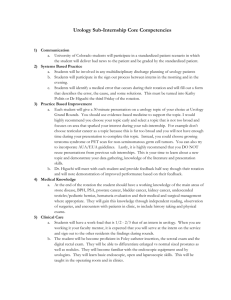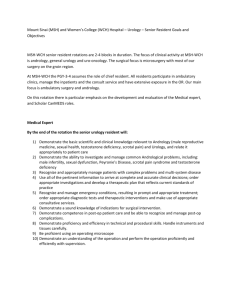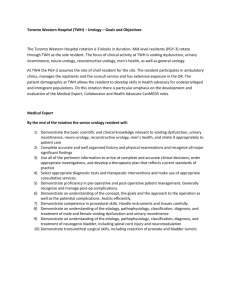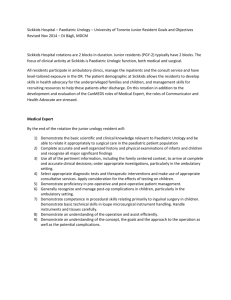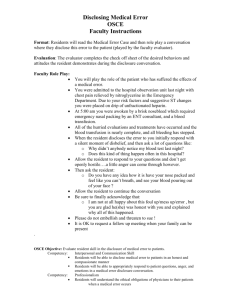Oncologic Urology
advertisement
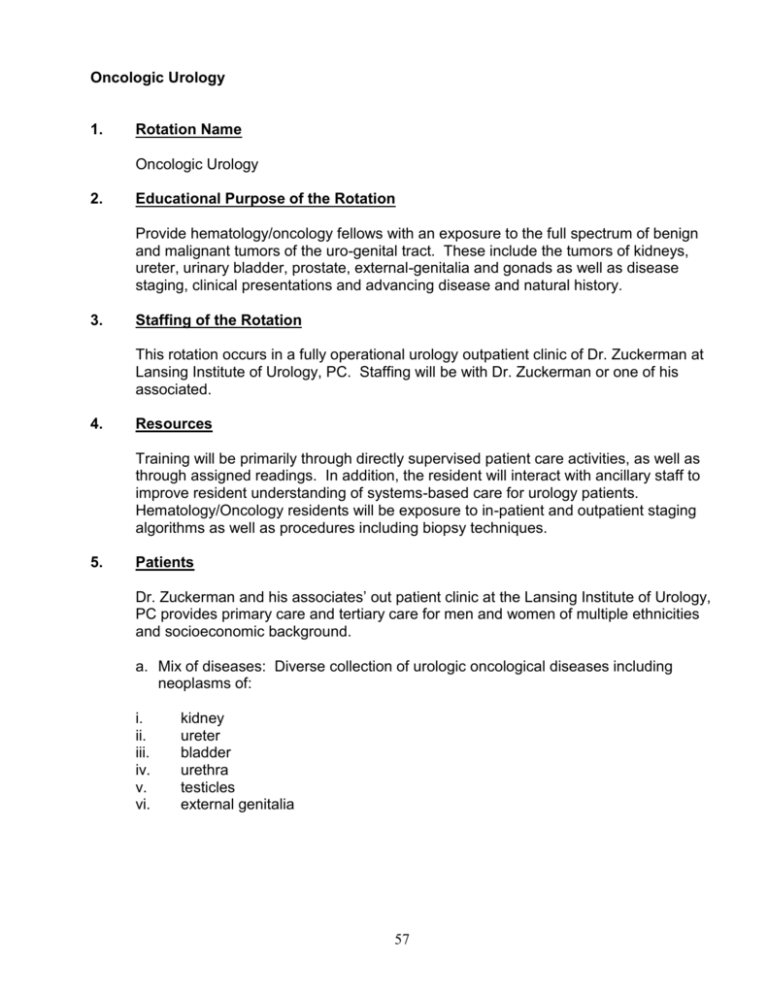
Oncologic Urology 1. Rotation Name Oncologic Urology 2. Educational Purpose of the Rotation Provide hematology/oncology fellows with an exposure to the full spectrum of benign and malignant tumors of the uro-genital tract. These include the tumors of kidneys, ureter, urinary bladder, prostate, external-genitalia and gonads as well as disease staging, clinical presentations and advancing disease and natural history. 3. Staffing of the Rotation This rotation occurs in a fully operational urology outpatient clinic of Dr. Zuckerman at Lansing Institute of Urology, PC. Staffing will be with Dr. Zuckerman or one of his associated. 4. Resources Training will be primarily through directly supervised patient care activities, as well as through assigned readings. In addition, the resident will interact with ancillary staff to improve resident understanding of systems-based care for urology patients. Hematology/Oncology residents will be exposure to in-patient and outpatient staging algorithms as well as procedures including biopsy techniques. 5. Patients Dr. Zuckerman and his associates’ out patient clinic at the Lansing Institute of Urology, PC provides primary care and tertiary care for men and women of multiple ethnicities and socioeconomic background. a. Mix of diseases: Diverse collection of urologic oncological diseases including neoplasms of: i. ii. iii. iv. v. vi. kidney ureter bladder urethra testicles external genitalia 57 6. Responsibilities Goal: The resident will gain exposure to a full range of benign and malignant tumors of the uro-genital tract. a. The residents will be expected to obtain a complete and focused history and physical examination and present it to the attending physician in a logical and timely manner. b. Learn the staging work-up of these tumors c. Demonstrate an increased proficiency in the ability to determine prognosis. d. Become familiar with the surgical management of these malignancies. e. Learn recommendations for further adjuvant modalities of these malignancies. f. Gain increased knowledge with patient directed literature searches. g. Work effectively with other members of the health care team. 7. Instructional Methods Faculty members teaching the oncology resident are responsible for: a. b. c. d. 8. Supervision of the resident in accordance with the supervision policy. Respond promptly to the resident’s questions/concerns. Provide the resident with ongoing performance feedback and skill progression. Increase the level of responsibility as the individual skill level progresses. Evaluation a. At the conclusion of this rotation, faculty members will summarize and accurately describe the resident’s performance on the provided form, discuss this evaluation with the resident and return the form to the residency director. b. The resident will summarize and accurately describe faculty performance and return it to the program office for inclusion in a computer generated report to ensure resident anonymity. 9. Schedule Monday AM Tuesday 7:30 Journal Club Urology Urology Wednesday Thursday Friday 7:00 am Sparrow Tumor Board 7:00 am IRMC Tumor Board 7:30 Hem/Onc Core Conference Urology Urology Urology 11:00 Breast Cancer Tumor Board PM Urology Urology Urology Urology Urology All activities in bold are required activities for all sub-specialty residents. 58 Note: During the week the sub-specialty resident attends at least two session of outpatient clinic at the Breslin Cancer Center. The times for this clinic vary from resident to resident and as such have not been including in this table. 10. Oncologic Urology Rotation Competency Objectives 1. Patient Care a) By the conclusion of the rotation, the Hematology/Oncology Resident will demonstrate the ability to perform an appropriate urological history and physical, documenting the findings as a consultative summary, with a differential diagnosis list. b) By the conclusion of the rotation, the Hematology/Oncology Resident will be able to perform the above skills and be able to independently generate an appropriate management plan. c) Demonstrate the ability to complete an efficient urological work up inclusive of history and physical, diagnostic procedures, problem list, working diagnosis and treatment plan. d) Follow assigned patients appropriately adjusting treatment plans as additional information or changes in the physical examination becomes evident. e) Demonstrate the ability to respond appropriately to abnormal test results. 2. Medical Knowledge a) All residents will be evaluated by the supervising faculty for their analytic approach to urological oncology conditions, and residents will be evaluated for satisfactory basic and clinical knowledge of medical aspects of urological oncology. b) Residents will learn the staging and work up of tumors of the uro-genital tract. c) Residents will become familiar with the surgical management of uro-genital tract malignancies and learn recommendations for further adjuvant modalities of these malignancies. d) Demonstrate a sound knowledge base pertinent to the broad range of illnesses common to the practice of urology. 3. Interpersonal and Communication Skills a) Residents are expected to demonstrate professional communication skills throughout their interactions with urologic patients. In addition, residents will be assessed for appropriate communication with Dr. Zuckerman’s office staff, including setting clear expectations for work hours and outpatient/inpatient duties. Residents will be expected to act as a constructive and proactive member of the practice. b) Residents will work effectively with physicians from other sub-specialties to coordinate patient care including development of a comprehensive treatment plan. 59 c) Demonstrate the ability to effectively work with other members of the health care team including other residents, attending physicians and other health care providers. d) Communicate effectively with patients and their families including conducting a family conference. e) Work effectively with physicians from other sub-specialties to coordinate patient care including development of a comprehensive treatment plan. 4. Professionalism a) Throughout the rotation, residents are expected to exhibit reliability in their clinical duties, as well as integrity and respect in their interactions with patients and colleagues. b) Residents will be able to demonstrate appropriate consultative principles of communication and responsiveness to professional consultative requests. 5. Practice Based Learning and Improvement a) Rotating residents will demonstrate self-initiative in the use of information technology to access and retrieve materials for self-education regarding urology cases. b) Rotating residents will be expected to show progressive learning throughout the rotation, with emphasis on learning from any cognitive or procedural errors. They are also expected to facilitate any quality improvement initiatives in place at Dr. Zuckerman and his associates’ practice. 6. Systems Based Practice a) All residents will demonstrate conscientious awareness of the impact of their professional activities on Dr. Zuckerman and his associates’ practice, and will conscientiously avoid inappropriate use of the practice resources. b) Residents must demonstrate understanding of cost-effectiveness of care incorporating cost-effectiveness into their development of diagnosis and treatment plans. 60

